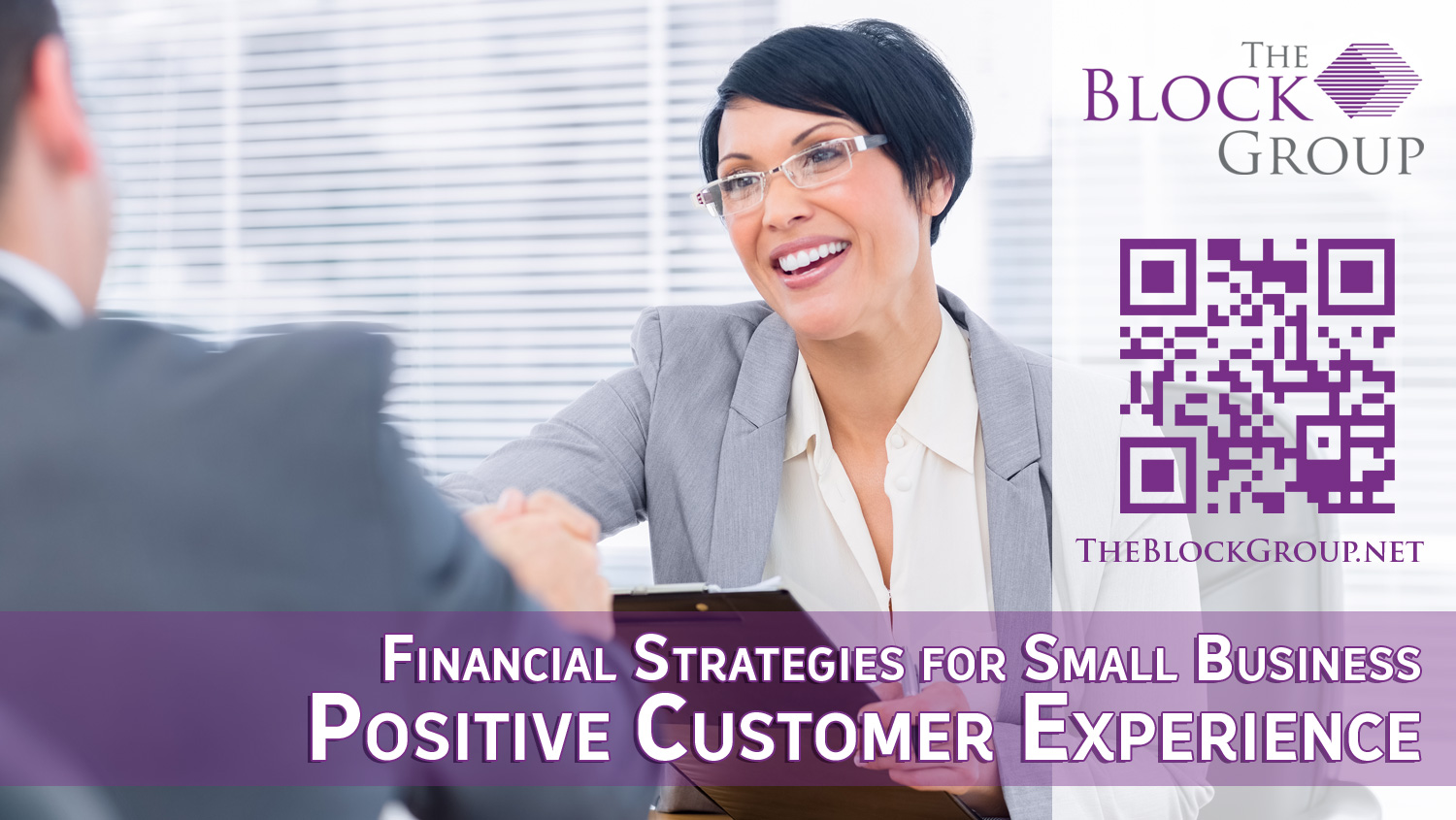
7 Strategies for a Positive Customer Experience
Financial Strategies for Small Business
1. Don’t narrowly define customer experience or functionalize it. - Customer experience is not simply something
for the frontline employees. It is everything that goes into creating an experience for a customer. From the first time a customer makes contact with a company, to the moment a customer ends their relationship, every process that has the customer as the focal point is part of customer experience. The customer’s experience with your product or service doesn’t stop simply because they aren’t in direct contact with you, so why should your definition.
2. Your customer’s voice. Listen to your customers, measure the experience you provide, and benchmark just for yourself. - Don’t assume you know what your customers are thinking. Let your customers tell you what is going wrong and right to discover how to improve the experience they receive. Measure your customer sentiment; use metrics such as NPS, CSAT or CES to understand how your customers perceive you.
Use the feedback you receive from metrics to benchmark internally. Cases can be made for benchmarking against others in an industry, but every company is unique and faces different challenges from the next. Use your metrics to create a standard by which to improve yourself, strive to beat your own past results and you will forge a path that isn’t reliant on emulating others.
3. The Relationship – Treat people like humans, apologize and be thankful. - The type of relationship you create with your customers is critical to creating an experience that customers want to come back to. Things won’t always go smoothly, and even at times when you think all is ok, your customers can perceive it differently. The key is not to obsess over it and analyze who is wrong and right, but to move past the problem. For the problem has taken place already and that can’t be changed. Maintaining a healthy relationship then is having staff that are emotionally and operationally equipped for problem resolution. Learn to apologize, be honest when your company has caused the problem, be clear in your communications with customers, and lastly always thank customers as a valued partner in your organization.
4. Online – Think about your User Experience and how social media can contribute. - Customers really are just looking for one thing when it comes to the online part of your experience: Can I find what I’m looking for. This means are you easy to use, is it easy to navigate through your site and is it presented in a way that everyone can understand.
Try your own website out from a customer perspective and figure out where you may be lacking. User Experience design isn’t a minor player anymore, in this digital age it is the only experience some customers receive.
5. Customer Support – It should be fast, personalized and allow customers to go the self-service route. - While building a relationship and a rapport with customers is important, the nuts and bolts of the customer support you provide needs to be fast and tailored to the needs of your customers. If using NPS in your customer service, make sure the tool you employ is real time, so you can respond to customer issues instantly. Well-organized workflows are also critical to the speedy nature of your service team, and don’t under resource your service team this will only leave agents rushing through customer interactions.
Also customer interactions should be personalized. This means remembering what happened yesterday. There isn’t anything more annoying to a customer than having to repeat themselves with each new interaction. This means using a workflow system that logs and tracks all previous interactions. Lastly, give your customers the option to solve problems themselves. A recent study found that 67% of customers prefer self-service. Customers prefer finding answers to their problems, as they feel it is quicker and they can learn as much or as little as they want. However, any self-service function should have escape options, meaning customers can find a pathway to reach an agent easily if they can’t find a solution.
6. Employees – Engage your employees and they will engage your customers. - It sounds so obvious and yet so many companies struggle with it; engaged employees make for better customer experience. Employees that are committed to their job because they enjoy it, find worth in it and feel appreciated will create a better experience for the customer. Just like your customers, employee happiness means investigating rather than assuming you know what is best, and as such this means measuring customer sentiment.
Also, create a culture whereby employees can talk openly and hierarchical structures of power do not influence an employee’s ability to speak freely and contribute ideas. Employees that are made to just follow directives with very little of their own input, will quickly become disengaged, but employees that can contribute to problems and resolutions will take ownership of the process.
7. The Future – Be proactive; find potential problems before they become real problems. - Don’t think just in terms of damage control, but think about the future; be proactive, don’t let problems that you have already seen coming become problems for your customers too. Making changes for the future always seems difficult but in the long not having to resolve customer complaints is far more beneficial.
Source: customergauge
Patty Block, President and Founder of The Block Group, established her company to advocate for women-owned businesses, helping them position their companies for strategic growth. Charting the course for impactful, sustainable, profitable businesses, the beacon is control: of your strategic direction, your money, your time, your staffing, and your ability to bring in business. The Block Group brings together the people, resources and ideas that build results.
Financial Strategies for Small Business.
Business Consulting for Women Entrepreneurs, Advice for Women Entrepreneurs, Business Coach in Houston, Growth Strategies for Small Business, Business coaching for women, Growth for Women-Owned Businesses, Houston Business Coaching, Financial Strategies for Small Business, Small Business Consulting, Business Management Consultant, Houston Business Consulting for Women Entrepreneurs, Houston Advice for Women Entrepreneurs, Houston Growth Strategies for, Small, Business,, Houston Business coaching for Women, Houston Growth for Women-Owned Businesses, Houston Financial Strategies for Small Business, Houston Small Business Consulting, Houston Business Management Consultant, The Block Group, Business, Consulting, Women, Entrepreneurs, Houston, Coach, Growth, Strategies, Coaching, Owned, Owner, Financial, Consulting, Management.





